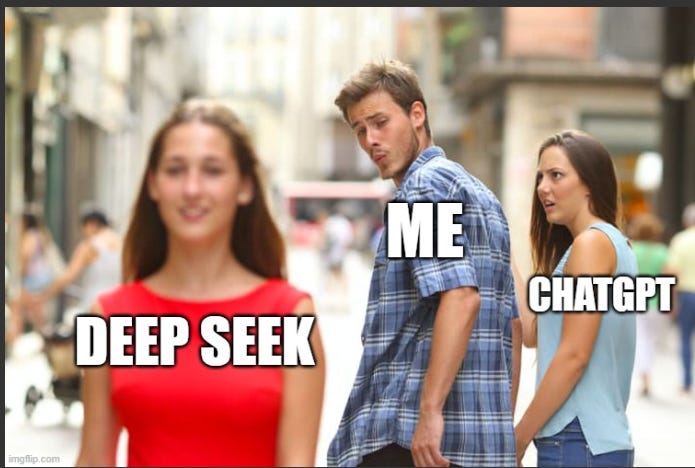So China launched open-source Deepseek AI as a LLM. And the internet blew up.
In fact, Deepseek R1 has ALREADY been integrated into Jeff Bezos’ backed Perplexity AI as a PRO feature.
What’s this all about?
DeepSeek's recent surge in popularity has caused significant disruption in the tech sector, leading to both excitement and concern.
Here are the key differences:
Architecture: DeepSeek employs a Mixture-of-Experts (MoE) architecture, activating only task-specific parameters, while OpenAI's models use a dense, general-purpose transformer architecture.
Cost-Efficiency: DeepSeek's R1 model was trained for just $5.58 million, making it 90% cheaper than OpenAI's estimated costs. This cost advantage is significant, with DeepSeek claiming to be 20 to 50 times more cost-effective than established AI services.
Performance: Benchmark tests indicate that DeepSeek-R1 slightly outperforms OpenAI's models in mathematical problem-solving, achieving a 79.8% accuracy rate. However, OpenAI's models excel in high-complexity, general-purpose tasks.
Open-Source Approach: DeepSeek has made its model available as open-source, allowing users to download and operate it locally. In contrast, OpenAI has adopted a more proprietary stance in recent years.
The Experts:
Here’s how the experts weight in:
Yann LeCun, VP & Chief AI Scientist at Meta, stated: "Open source models are surpassing proprietary ones.”
Marc Andreessen called DeepSeek R1 "one of the most amazing and impressive breakthroughs I've ever seen — and as open source, a profound gift to the world".
William Falcon, CEO of Lightning AI, commented: "If these models turn out to be pretty capable, which they really are looking like, and they're very cheap, then there's a world where companies stop using OpenAI at scale.
And that last one is a problem.
People have been cancelling their ChatGPT Pro subscriptions.
The Controversy:
Well, it’s from China. You remember that TikTok just got temporarily banned in the US (probably more as a stunt to flex on China.)
But there are some controversial issues:
Potential IP Theft: There are allegations that DeepSeek may have used OpenAI's models to boost its own application, raising legal concerns.
(of course, OpenAI was trained on illegally accessed material.) But that’s different. This is China 🤦Market Impact: DeepSeek's app surpassed ChatGPT downloads in the U.S. App Store, causing anxiety among investors and leading to a sell-off in tech stocks.
Security Concerns: The U.S. Navy has warned against using DeepSeek's application due to potential security risks.
Competitive Advantage: DeepSeek's cost-effective model challenges the existing paradigm, potentially disrupting the AI market and threatening established players.
Geopolitical Implications: As a Chinese company, DeepSeek's success has raised concerns about competition in the AI sector between China and the United States.
So Deepseek has disrupted the AI game, and the established players are not happy about it. There is definitely a lot of “stealing” going on in public, as I documented in a previous edition of this newsletter.
And the innovations will continue to come.
At the end of the day, we as consumers need better ways to learn how to use AI. But that will come in another issue.







The Deepseek AI drama is less about China vs US and more about open-source vs a competitive moat.